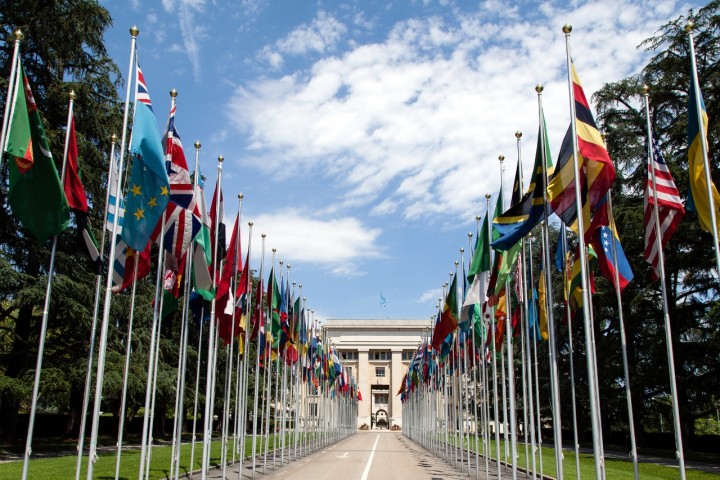As meetings continue at the Open-Ended Working Group in Geneva, Switzerland which has convened to advance in measures for nuclear disarmament, civil society organisations and campaigns have the chance to contribute. ICAN (the International Campaign to Abolish Nuclear Weapons), of which Pressenza is a member, today gave the following statement to the delegations present.
Thank you Mr. Chairman,
I’m speaking on behalf of the International Campaign to Abolish Nuclear Weapons (ICAN), a global campaign coalition representing more than 430 non-governmental organisations from almost 100 countries.
The panel on legal measures that we heard yesterday highlights that we are currently lacking an instrument that explicitly characterizes nuclear weapons as unacceptable under international law. And this open-ended working group is an appropriate place to start the practical work to address this legal gap.
Some states have said yesterday and today that there is no legal gap, that article 6 [of the NPT] contains all we need.
But there are many activities that run counter to achieving a world free of nuclear weapons, activities that are still not clearly prohibited under international law.
For example, there are non-nuclear weapon states that are:
- Hosting nuclear weapons on their territory;
- Participating in nuclear war planning;
- Training nationals to deliver nuclear weapons;
- Facilitating intelligence gathering for nuclear targeting;
- Claiming protection from an ally’s nuclear weapons;
- Discouraging an ally from pursuing disarmament or reduction of the role of nuclear weapons in security doctrines;
- Allowing nuclear-armed ships to enter their waters;
- Allowing nuclear-armed aircraft into their airspace;
- Allowing nuclear weapons to transit through their territory;
- Contributing to nuclear weapon modernization programmes;
- Financing nuclear-weapon-producing companies;
- Supplying nuclear-capable delivery vehicles;
- Supplying uranium without comprehensive safeguards;
- Stockpiling weapon-grade fissile material.
These policies and practices demonstrate that there are indeed gaping holes in the current legal regime governing nuclear weapons. Filling these holes would contribute to the fulfillment of article VI obligations.
ICAN believes this gap should be addressed through a prohibition of the development, production, testing, transfer, acquisition, transit, stockpiling, deployment, and use of nuclear weapons, as well as assistance, financing, encouragement, or inducement of these activities.
ICAN also believes that such an instrument should provide an obligation for the complete elimination of nuclear weapons and a framework to achieve it. Such a new legally binding instrument would not need to establish specific provisions for elimination, but states parties to the treaty could agree to relevant measures and timelines as part of the implementation process, through protocols or other appropriate legal instruments.
In addition, ICAN strongly argues that such an instrument also should include positive obligations for states parties, such as ensuring the rights of victims and survivors of nuclear weapons, requiring actions to address damage to affected environments, and providing for international cooperation and assistance to meet the obligations of the instrument.
Such an instrument is urgently needed, because of the continued risks of a nuclear detonation and the unacceptable humanitarian consequences that any use of nuclear weapons cause. But we’d also like to remind all states about article VI of the Non-Proliferation Treaty (NPT), all states – not just the five nuclear-weapon states – are legally required to pursue negotiations “in good faith” for nuclear disarmament.
Non-nuclear-weapon states are not merely encouraged to take positive steps towards nuclear disarmament; they are required to do so – regardless of the continued failure of nuclear-weapon states to act.
This requirement also means that non-nuclear-weapon states should refrain from doing anything that would make nuclear disarmament less likely or impossible to achieve.
The Humanitarian Initiative has shown the important role that non-nuclear-weapon states can play in raising awareness about nuclear dangers and in building momentum for nuclear disarmament.
The International Campaign to Abolish Nuclear Weapons looks forward to working with all states and international organisations on achieving a new legally binding instrument on prohibiting nuclear weapons.










